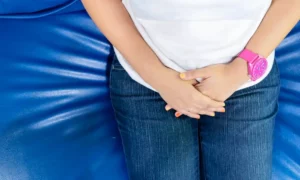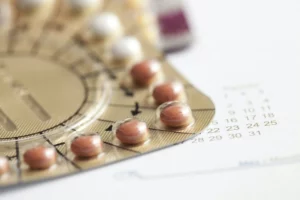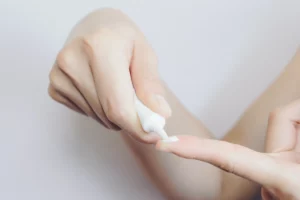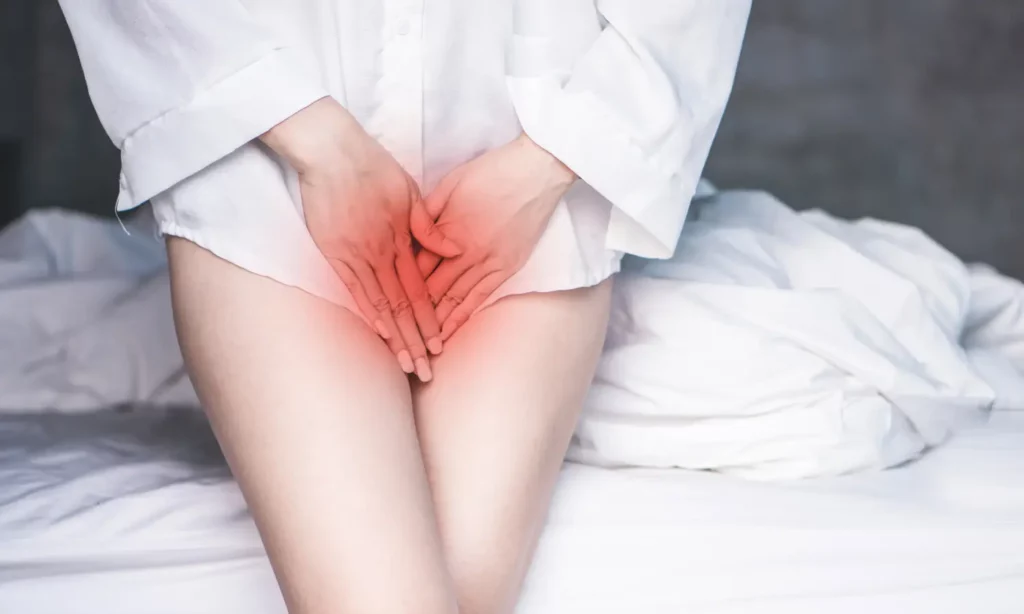Menopause is a normal stage in a woman’s life when her body undergoes significant hormonal changes. During this time, levels of estrogen and progesterone drop, leading to various symptoms. One common and uncomfortable issue is vaginal dryness. Understanding why this happens is crucial. It is due to the hormonal shift affecting the tissues in the vagina, causing a lack of moisture. This, in turn, can bring about discomfort and other challenges. But the good news is, there are effective treatment options available to manage and cope with vaginal dryness during or after menopause. Exploring these options can make a significant difference in improving comfort and overall well-being. So let’s dive in and explore them!
Contents
Why Does Vaginal Dryness Happen During or After Menopause?
The vagina usually has a little moisture that keeps it healthy and comfortable. However, when menopause sets in and estrogen production starts to decline. As a result, the usual secretions and moisture lessen, leading to the common issue of vaginal dryness.
Causes Behind Vaginal Dryness

- Hormonal Changes: The primary cause is the significant hormonal changes during menopause. As estrogen levels drop, the vaginal tissues undergo alterations, reducing moisture and causing dryness.
- Medications: Some medications, such as those for allergies or hypertension, can contribute to vaginal dryness as a side effect. It’s essential to be aware of the potential impact of medications on vaginal health.
- Emotional Factors: Surprisingly, emotional factors play a role. Stress and anxiety can impact hormonal balance, exacerbating vaginal dryness in menopausal women. Addressing emotional well-being is integral to managing this aspect of menopausal symptoms.
What All Comes Up With Dryness?
 Vaginal dryness isn’t just a minor issue; it can bring along a range of effects on a woman’s health. Let’s look at the symptoms and impacts of this common problem:
Vaginal dryness isn’t just a minor issue; it can bring along a range of effects on a woman’s health. Let’s look at the symptoms and impacts of this common problem:
- Discomfort and Pain: Vaginal dryness often leads to irritation, burning, or itching, making daily activities and intimacy uncomfortable.
- Impact on Intimacy: The dryness can strain intimate relationships, affecting closeness and enjoyment during sexual activity.
- Psychological Effects: Beyond physical discomfort, vaginal dryness can take a toll on mental well-being, causing stress and anxiety.
- Lowered Sex Drive: Vaginal dryness may contribute to a decreased interest in sexual activity, impacting overall sexual satisfaction.
- Post-Sex Bleeding: Dryness can lead to friction during intercourse, potentially causing post-sex bleeding and further discomfort.
- Recurring Urinary Tract Infections: Vaginal dryness may increase the risk of urinary tract infections, adding another layer of health concern.
Understanding these symptoms is crucial to address the issue effectively and improve overall health and quality of life.
Treatment Options For Vaginal Dryness During Menopause

When it comes to managing vaginal dryness during or after menopause, various treatment options are available. Let’s explore some medical treatments that could be prescribed for you:
Medical Treatments for Menopausal Vaginal Dryness

- Vaginal Estrogen Therapy: This involves using estrogen in the form of creams, rings, or tablets directly applied or inserted into the vagina. It helps restore the estrogen levels in the vaginal tissues, alleviating dryness and discomfort.
- Dehydroepiandrosterone (DHEA): DHEA is a hormone precursor available in a prescription form. It can be applied to the vagina and may help improve moisture and elasticity.
- Ospemifene: Ospemifene is an oral medication that can address vaginal dryness by acting like estrogen in the vaginal tissues. It is particularly helpful for women experiencing pain during sexual activity.
These medical treatments aim to target the root cause of vaginal dryness, providing relief and improving the overall quality of life for women going through menopause. However, it’s essential to consult with a healthcare professional to determine the most suitable treatment based on individual needs and health conditions.
Home Remedies for Menopausal Vaginal Dryness
 Alongside medical treatments, several home remedies can contribute to managing and easing the symptoms of vaginal dryness during or after menopause. Consider incorporating the following into your routine:
Alongside medical treatments, several home remedies can contribute to managing and easing the symptoms of vaginal dryness during or after menopause. Consider incorporating the following into your routine:
1. Hydration
Drinking plenty of water helps maintain overall bodily moisture, including the vaginal area. Staying well-hydrated supports the body’s natural lubrication.
2. Dietary Adjustments
Including foods rich in omega-3 fatty acids, such as salmon and flaxseeds, and vitamin E, found in nuts and seeds, can positively impact vaginal health.
3. Regular Sexual Activity
Engaging in regular sexual activity promotes blood flow to the genital area, contributing to natural lubrication. It also helps maintain the elasticity of the vaginal tissues.
4. Non-prescription Moisturizers
Over-the-counter moisturizers designed for vaginal use provide additional moisture and can be applied as needed for comfort.
5. Lubricants
Water-based or silicone-based lubricants are readily available without a prescription. These can enhance comfort during sexual activity and alleviate dryness.
6. Herbal Supplements
Some women find relief with herbal supplements like black cohosh. However, it’s crucial to consult with a healthcare professional before trying any supplements to ensure safety and efficacy.
7. Warm Compress
Applying a warm compress to the vaginal area can help soothe discomfort and promote relaxation.
8. Cotton Underwear
Wearing breathable cotton underwear allows for better airflow and reduces irritation, contributing to overall vaginal health.
9. Avoiding Irritants
Steer clear of harsh soaps, perfumes, and other potential irritants in the genital area to prevent exacerbating dryness.
It’s essential to remember that home remedies may vary in effectiveness for each individual. Consulting with a healthcare professional ensures a tailored approach to managing menopausal vaginal dryness based on personal health needs and preferences.
Treatment for Sex-Related Vaginal Dryness During Menopause
 Sex-related vaginal dryness can significantly impact intimacy and overall sexual satisfaction. Fortunately, there are targeted treatments specifically designed to address this aspect. Explore the following options for managing and overcoming sex-related vaginal dryness:
Sex-related vaginal dryness can significantly impact intimacy and overall sexual satisfaction. Fortunately, there are targeted treatments specifically designed to address this aspect. Explore the following options for managing and overcoming sex-related vaginal dryness:
1. Lubricants to Use During Sex
Utilizing water-based or silicone-based lubricants can provide immediate relief during sexual activity. These products enhance moisture, reducing friction and discomfort.
2. Vaginal Moisturizers
Non-prescription moisturizers designed for the vaginal area can be used regularly to maintain moisture levels and support sexual comfort.
3. Low-Dose Vaginal Estrogen
Applying estrogen directly to the vaginal area, whether through creams, rings, or tablets, can be effective in restoring moisture and improving elasticity for a more comfortable sexual experience.
4. Hormone Replacement Therapy (HRT)
HRT involves the use of estrogen to alleviate symptoms, including vaginal dryness. It can be an effective option for managing sex-related discomfort.
5. Pelvic Floor Exercises
Strengthening the pelvic floor muscles through exercises, such as Kegels, can enhance blood flow to the genital area, supporting natural lubrication and improving sexual function.
6. Experimenting with Different Positions
Trying different sexual positions can help reduce friction and discomfort. Find positions that minimize pressure on sensitive areas to enhance comfort.
7. Pre-Sexual Activities
Engaging in extended foreplay and incorporating activities that promote arousal can enhance natural lubrication and make sexual activity more comfortable.
It’s crucial to consult with healthcare professionals to determine the most appropriate and effective treatment for sex-related vaginal dryness based on individual health conditions and preferences. Open communication with your healthcare provider and your partner plays a vital role in finding solutions that enhance both physical and emotional well-being.
Conclusion
In the journey of addressing vaginal dryness during or after menopause, adopting a holistic treatment approach proves to be crucial. Recognizing that this condition extends beyond physical discomfort is the first step. It encompasses emotional well-being, intimate relationships, and overall quality of life.
A holistic approach involves a combination of medical treatments, home remedies, and open communication. From utilizing lubricants and moisturizers to considering low-dose vaginal estrogen or hormone replacement therapy, each aspect plays a role in managing this common menopausal symptom.
Seeking advice tailored to individual needs, preferences, and health conditions ensures a more effective and personalized treatment plan.
If you are facing menopause related issues, menopause treatment at HerMantra can help. Book your free trial online menopause treatment session now.


